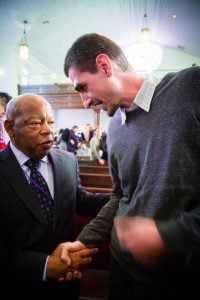 Yesterday, I began a conversation with Fred Bahnson, one of my favorite authors, about what it is we’re doing when we write. I concluded by asking, “Don’t you think it’s fair to say that some stories evoke social change more than others? I mean, what’s the difference between a Jane Austen and a Charles Dickens? We do decide, each of us, what we pay attention to, which stories we tell. What effect do these decisions have on the world around us?
Yesterday, I began a conversation with Fred Bahnson, one of my favorite authors, about what it is we’re doing when we write. I concluded by asking, “Don’t you think it’s fair to say that some stories evoke social change more than others? I mean, what’s the difference between a Jane Austen and a Charles Dickens? We do decide, each of us, what we pay attention to, which stories we tell. What effect do these decisions have on the world around us?
Below is Fred’s response. It is, by itself, a great example of why I love to read Fred.
I agree. Good writing begins with concrete engagement with the world. And I love the way you describe why you came to care about prison reform. Or rather, not why you care about “prison reform” in the abstract, but why you care about Roy and others like him, and in writing about their lives you help others to care, too. I think the most important thing good writing can do is create empathy. And here’s the thing: whatever social change might result–Uncle Tom’s Cabin, for instance, playing a role in the Civil War–it always happens first on the most intimate level possible, as a conversation between two people. Reader and writer. When we’re true to our craft, we’re creating a container for empathy. And it begins with a concrete story, an individual life. A word. Gesture. Image.
As to your question about which stories are worth telling, let me respond first as a reader and second as a writer.
As a reader: you’re right that certain stories lead to social change and others don’t. I don’t want to say that we should do away with Jane Austen just because her stories aren’t going to incite the next Occupy movement. That’s not what you’re saying, either. But it’s worth noting that for those of us who want to see social change, we shouldn’t chose our reading solely based on “the issue.” If we did we’d end up emotionally impoverished. We should read as widely and deeply as we can. And yet, we do make choices in which stories we read, and clearly some stories are more compelling than others. Some stories do lead to changed lives, others just lead to, well, fuzzy thinking. I don’t read much modern fiction for that reason. I just don’t finally give a damn about some twenty-something hipster from Williamsburg wading through the muddle of his middle-class anxieties (I subscribe to the New Yorker, and I almost never read the short stories for that reason). There are notable exceptions in modern fiction, like Marilynne Robinson’s Gilead, but when I read fiction I’d rather just re-read the Russians or Flannery O’Connor or start another classic.
As a writer: I’m struck by what you said about how each of us must decide what we pay attention to. In Soil and Sacrament, I wrote about four agrarian faith communities: a Trappist monastery that grows mushrooms in South Carolina, a Protestant communal food garden in North Carolina, a Pentecostal farm and coffee business in Washington, and a Jewish farm in Connecticut. But before choosing those, I researched dozens of similar communities. I could have, for instance, written about a group of nuns at a place called Genesis Farm up in New Jersey. I learned that those nuns were heavily influenced by Thomas Berry, whose thinking strikes me as a bit wacky and obtuse, so I decided not to go. I’m sure those nuns are great ladies, and they clearly do good work. But when it comes down to it, the Thomas Berry Story of Reality is not one I’m particularly interested in promoting. I think there are better ways to think about faith and environment.
I was much more drawn to this obscure group of Trappist monks. They weren’t promoting some snazzy new philosophy involving evolutionary cosmology. They were just a group of mostly 70-and-80-year old men trying to lead lives of faithful prayer while they cared for their piece of land along the Cooper River. Which is to say, they were just living the 1,500 year old Benedictine Rule, and it was indeed leading them closer to God. They didn’t call attention to themselves. They weren’t trying to convince anybody of anything. They were just sort of plodding along in their quiet, lovely, non-heroic way. And as I was trying to tell this larger story in Soil and Sacrament about our need to care for this Garden called Earth, it struck me that the examples of the brothers at Mepkin had a lot to teach us.
To return to your earlier point, if I launched into an argument about what the Benedictine tradition has to teach North American Christians concerned about the environment, I would have lost most of my readers, and the only ones who would have kept reading would be those already convinced anyway. I have no interest in preaching to the choir. I wanted to write for people outside the family of faith, or for Christians who weren’t all that interested in caring for the earth. And so I wrote about the details of the monks lives. I wrote about my choir mate Brother Gregory, for example, how once at the end of Lauds I looked over and he was dozing, his head in his lap, a bit of drool forming on his lips. He was 92 at the time. I wrote: “It seemed to me as if Brother Gregory was returning to the fetal position, as if through all those years of bowing and rising, God had been slowly curling him up again before bringing him home.”
Does a story about Trappist monks practicing earth care need an image like this to make it work? Perhaps not. But in order for the reader to care about the larger issues, details like this are indispensable. I don’t know why, but I’m particularly fond of this one. As I experienced it, it was an utterly intimate, human moment but one brimming with mystery. It still gives me a shiver whenever I think of it. That kind of feeling where you’re reading along and a story suddenly opens up and the bottom drops out and you’re left reeling in recognition–those are experiences I love as a reader and ones I try to create as a writer. Pointing to the larger Mystery in which we live and move and have our being should always be the writer’s the first aim. And we do it through details.
“No ideas but in things,” wrote William Carlos Williams. Whatever social change might or might not result from my book, I want the reader to experience such moments, because that sense of mystery and the empathy that comes from immersing ourselves in another’s life, those are qualities that will make us want to care for others and for the world. How we care is always secondary, but the desire to do so comes first. Coaxing that desire out of people–that’s the role of literature.











